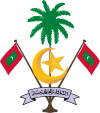Crime in the Maldives
There is a low rate of crime in the Maldives. Incidents of theft on beaches or in hotels do occur.[1] Although the crime rate in the nation is generally considered to be low, crime rates are increasing.[2] Juvenile delinquency is a growing problem in the Maldives. According to the data available from the Ministry of Defence and National Security, there is an increase in petty crime in the country. In 1992, 169 cases of petty crime were reported while the number was 462 in 1996. The number of sentenced persons under the age of 19 also increased from 391 in 1988 to 512 in 1998.[3] Fraud examiner Peter Lilley in his book Dirty Dealing writes that money laundering is not a significant problem in the Maldives.[4]
"Drug abuse in Maldives has reached alarming levels, and, according to several ministries and high ranking officials, is now the most serious problem the country is facing."
— Report of the International Narcotics Control Board 2006[5]
Drug abuse is increasing in the country.[1] The Maldives are situated in a location which is not too far from one of two major illicit opium producing centers in Asia - the Golden Triangle[6] comprising Myanmar, Thailand and Laos.[7] Many tourists visit the country from different parts of the world like Europe, the Middle East, South Asia and East Asia. These factors make the Maldives vulnerable as a point for illegal shipments of drugs meant for other nations.[6] Abuse of illegally produced heroin is a visible problem in the Maldives along with other South Asian countries like Bangladesh, India, Nepal and Sri Lanka.[5] The United Nations Office on Drugs and Crime (UNODC) believes that drug trafficking in the Maldives is a side effect of the nation’s increased exposure to the outside world.[8] Drug abuse is also associated with increasing incidents of theft and robbery.[9]
Threat of terrorist attack is a matter of concern.[10] The Department of Foreign Affairs and Trade (DFAT) of the Government of Australia advised travelers "to exercise caution" because of the high threat of terrorism.[11] According to the Foreign and Commonwealth Office (FCO), "Attacks could be indiscriminate, including in places frequented by expatriates".[10]
Rate of criminal homicide and assault in the Maldives declined by 30% between the years 1997-2002. Crime involving bribery and fraud also declined by 33% during this time.[8] In the Corruption Perceptions Index 2007, the Maldives was ranked 84th out of 179 countries for corruption (least corrupt countries are at the top of the list). On a scale of 0 to 10, with 0 being the least and ten being most transparent, Transparency International rated the Maldives 3.3.[12]
References
- ^ a b Maldives United States Department of State
- ^ Amita Gupta (2007). Going to School in South Asia. Greenwood Publishing Group. p. 113. ISBN 978-0-313-33553-2.
- ^ Rapid Situation Assessment of Drug Abuse in Maldives. United Nations Publications. 2003. p. 14. ISBN 978-92-1-120184-0.
- ^ Peter Lilley (2003). Dirty Dealing: The Untold Truth About Global Money Laundering, International Crime and Terrorism. Kogan Page Publishers. p. 219. ISBN 978-0-7494-4034-3.
- ^ a b International Narcotics Control Board (2007). Report of the International Narcotics Control Board 2006. United Nations Publications. p. 67. ISBN 978-92-1-148218-8.
- ^ a b Rapid Situation Assessment of Drug Abuse in Maldives. United Nations Publications. 2003. p. 15. ISBN 978-92-1-120184-0.
- ^ P. J. Alexander (2002). Policing India in the New Millennium. Allied Publishers. p. 658. ISBN 81-7764-207-3.
- ^ a b Maldives United Nations Office on Drugs and Crime
- ^ International Narcotics Control Board (2007). Report of the International Narcotics Control Board 2006. United Nations Publications. p. 68. ISBN 978-92-1-148218-8.
- ^ a b Maldives Foreign and Commonwealth Office
- ^ Maldives Department of Foreign Affairs and Trade, Government of Australia
- ^ Corruption Perceptions Index 2007 Transparency International

